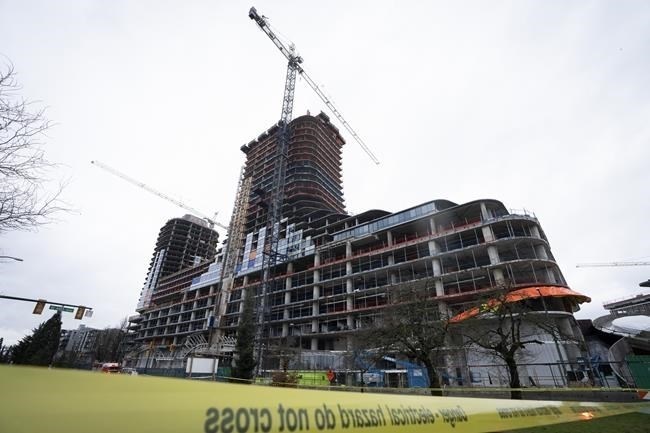
A load on a crane fell from the top of the building, smashing multiple floors of the Oakridge Mall construction in Vancouver, B.C., on Wednesday, Feb. 21, 2024. There has been another crane accident in Metro Vancouver, in what B.C.'s workers' safety agency says is the fourth such incident this year.
Image Credit: THE CANADIAN PRESS/Ethan Cairns
March 05, 2024 - 2:58 PM
VANCOUVER - British Columbia's workers' safety agency says construction crane accidents have become "a huge concern," as it announced a fourth such incident this year in Metro Vancouver.
WorkSafeBC says it is calling industry and labour groups together for a "collaborative effort" to ensure safety, including discussions on proposed legislation that would require any major operation involving cranes to give the agency two weeks' notice.
The action comes after an accident involving a construction crane at a work site in Vancouver on Monday, where WorkSafeBC has issued a stop-use order on the crane and shut a section of the site until a safety assessment is completed.
"This is a huge concern for WorkSafeBC," said Suzana Prpic, the agency's senior manager of prevention field services. "It underscores that workplace safety is critical and it can never be taken for granted."
WorkSafeBC says in a statement that no one was injured in the latest incident and preliminary evidence indicated few if any similarities between this crane accident and three others in Metro Vancouver this year.
No specifics on Monday's crane accident have been released.
Last month, female worker Yuridia Flores was killed in Vancouver's Oakridge neighbourhood when a load fell from a crane onto an unfinished highrise.
On Jan. 26, a section of Lougheed Highway in Burnaby was temporarily shut down when a crane collapsed and dangled from a highrise tower under construction. Four days later, a crane at a site in Surrey appeared to partially collapse.
"Each of the incidents that has occurred are slightly different," Prpic said. "And we'll await the results of the investigation so that we can share more details."
The issue of crane safety has re-emerged this year after police asked provincial prosecutors to consider criminal charges over the collapse of a crane in Kelowna, B.C., in July 2021. Five people were killed, four on the construction site and one person in a building next to the site, when the crane was being dismantled.
WorkSafeBC says there were 22 incidents involving tower cranes from 2019 to 2023 including the Kelowna collapse.
The agency estimates there are about 350 tower cranes currently operating in B.C., with about 650 credentialed operators across the province.
“Incidents involving cranes can be catastrophic, and we are very concerned with the number of incidents that have occurred in such a short period of time,” said Todd McDonald, the head of prevention services at WorkSafeBC in a statement.
In response to the recent string of incidents, WorkSafeBC says it is planning to bring crane operators, labour and the BC Association of Crane Safety together to discuss how to prevent future accidents.
The agency met with employers and the union representing trade workers in heavy construction on Tuesday to talk about proposed legislation.
Prpic said the agency is hoping the legislation would be "in place" this fall, requiring operators to notify WorkSafeBC for actions such as setting up, repositioning and dismantling of any tower crane on a work site.
"It gives us a chance to again review that all of the requirements are in place," she said. "The safe work procedures, the assignment of supervision in terms of those four key activities, and any other questions at that time can be reviewed with the board officer that would attend the site."
The recent accidents have prompted calls for better enforcement of existing safety rules and new regulations governing the assembly and dismantlement of the machines — including from the father of one of the men killed when the crane collapsed in Kelowna.
B.C.'s government has said safety changes are in the works, which could be announced in the next few months.
This report by The Canadian Press was first published March 5, 2024.
News from © The Canadian Press, 2024